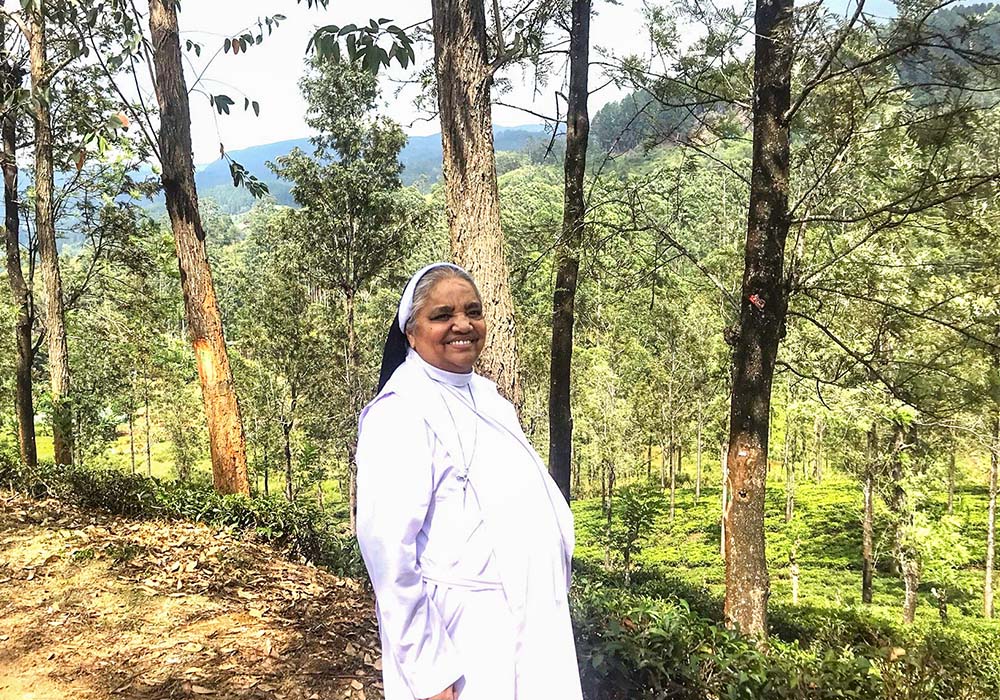
Apostolic Carmel Sr. Maria Amali at a tea plantation at Pussellawa in Sri Lanka, where she visits workers, despite her painful abdominal cancer (Thomas Scaria)
Apostolic Carmel Sr. Maria Amali served as a crisis manager during the three-decade civil war in northern Sri Lanka, mainly in the Mannar, Jaffna and Batticaloa areas. She faced life-threatening situations several times during the war period.
The civil war between the separatist Tamil militants and the Sri Lankan government between 1983 and 2009 killed an estimated over 100,000 people. During this period, the tsunami that hit the Sri Lanka shores on Dec. 26, 2004, claimed more than 30,000 lives and displaced thousands.
Amali served the survivors of the 2004 tsunami. She also gathered a group of volunteers to help bury 220 people who were killed by the tsunami around her convent in a coastal village.
Amali, who was diagnosed with abdominal cancer in 2017, celebrated her 40 years of religious life on April 12. Unmindful of her disease, she serves tea plantation workers.
She shared with Global Sisters Report in April her mission of crisis management.
_____
GSR: You joined religious life when your country was under the civil war. What was your inspiration?
Amali: My vocation has nothing to do with the civil war, as I joined the convent before the war began. But the war had already started when I took my final vows in 1984.
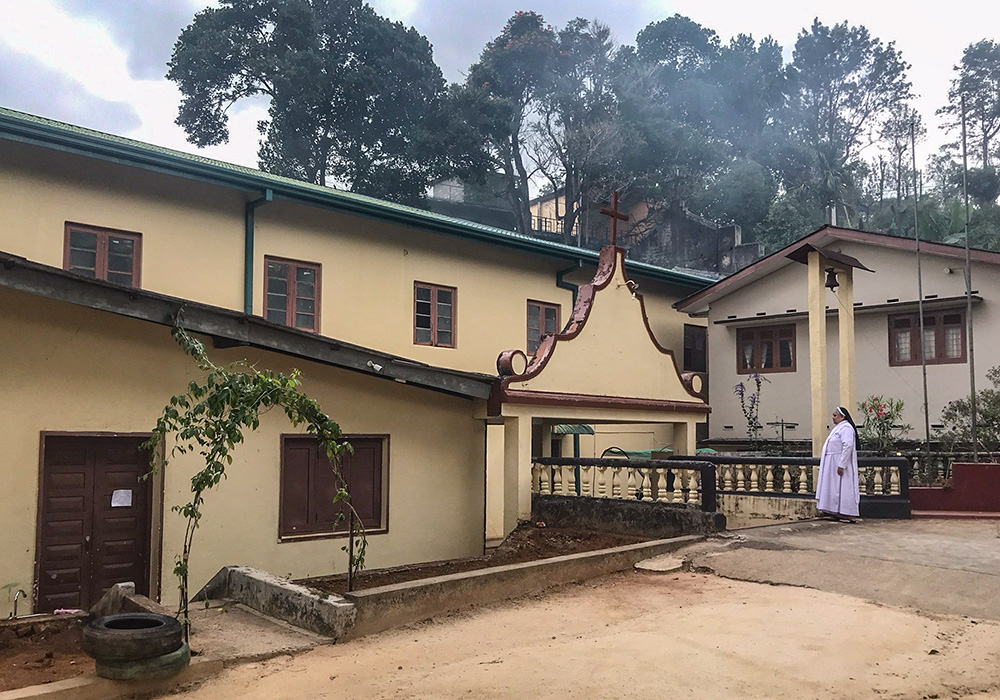
Apostolic Carmel Sr. Maria Amali at the entrance of her nearly 100-year-old convent at Pussellawa, Sri Lanka (Thomas Scaria)
My first appointment was in a conflict area, so you could say my religious journey was among war victims on the battlefield. I lived my religious life in the war zones for 26 years and even after the war.
Did you ever think of escaping to a safer place?
No. I was determined to continue in the war zone even after I was wounded seriously while trying to help some victims. I also had several narrow escapes during shelling and firing. I took care of the wounded on both sides — Sinhalese and Tamils. I firmly believe God had called me for that ministry.
Please elaborate on how you were wounded.
It was an accident during a visit to a temporary prison where our boys were tortured for alleged links with the LTTE [Liberation Tigers of the Tamil Eelam]. I presented the boys' credentials to the officers and returned with them in an open tractor. On the way, shelling started. The driver stopped the tractor and then accelerated it suddenly to escape shelling. But I lost my balance and fell down, injuring my spinal cord.
After four months of intensive treatment, I came back to my convent and resumed work among the villagers who had survived.
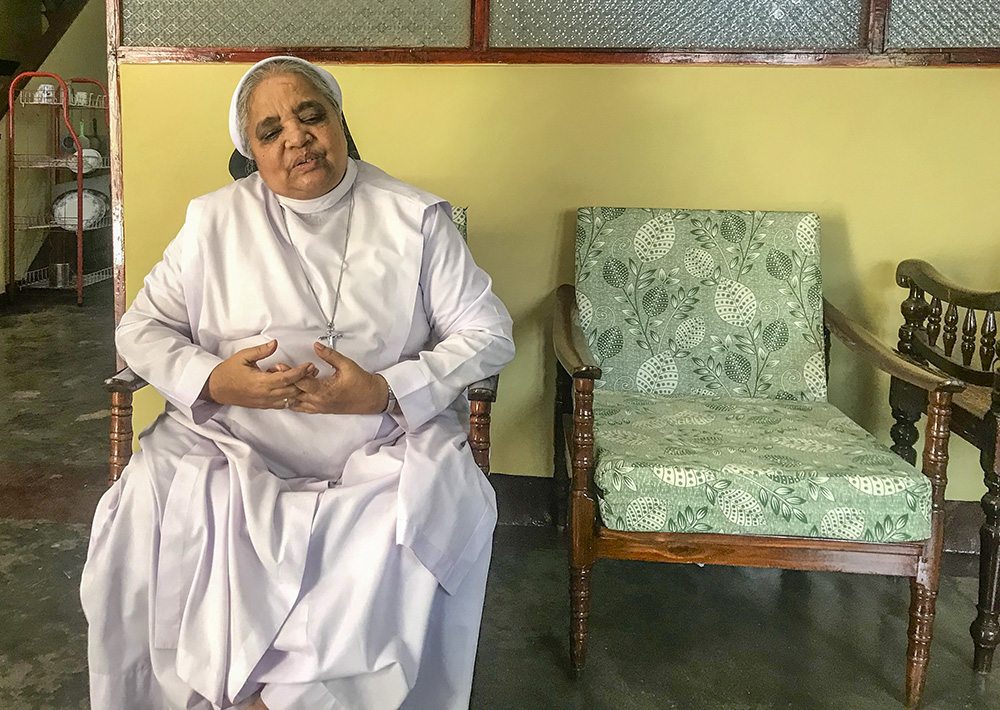
Apostolic Carmel Sr. Maria Amali recounts her ministry among the victims of the 1983-2009 civil war in Sri Lanka. (Thomas Scaria)
The Sinhalese army, who respected Catholic nuns, advised me several times to go to the south, which was relatively safer. Even my sisters told me so. But I continued there. Once, brain malaria made me critical, but after battling for life in a hospital for 35 days, God saved me.
You are a Tamil. Did the government agencies, who are mostly Sinhalese, suspect that you had LTTE links?
I don't think so. I was among the few nuns in the forefront, nursing the wounded irrespective of their ethnicity. Both Sinhala and Tamil groups respected me. Several Sinhala young people, who were forcefully recruited into the army, died in the battle. I was there to offer them water before they died.
How did the war and suffering affect your religious life?
I kept the image of the crucified Christ and Mother Mary always in my mind and drew courage and inspiration from them on the battlefield. I could have been killed in the war, but I believe God saved me to serve others.
I always trusted in God's providence and guidance. I would not have survived on the battlefield for 26 years without God's protection. I could live my religious life in full even when I went hungry, sick and experienced real poverty. Soldiers always risk their lives on the battlefield. Mine was no exception.
Advertisement
Besides caring for the war victims and their families, you were also at the service of the dead.
True! On the battlefields, we meet the wounded and dead. I attended the burial of several killed in bombings, suicide attacks or shelling. I knew several victims and felt frustrated.
One day, a Hindu woman came running to our convent and asked me to come to her village, which the military forces had surrounded. She trusted me so much, and I could not refuse her. When I reached the village, 13 people were killed, including some of her family members.
As I knelt down to pray for the dead, I heard her shout, "Lie down, lie down." Another round of shelling started. When I looked back, I was shocked to see the woman collapsing, hit by a bullet that severed her head. I wept like a child as I lifted her body.
Another shock came during the tsunami. The killer waves killed hundreds around our convent. I personally buried nearly 220 people, mostly Hindus.
Could you elaborate more about the tsunami burial?
The tsunami hit Sri Lanka, which was already reeling under the civil war. At least 30,000 people died in Sri Lanka, mostly on the northern coasts where the civil war [went] on.
Our convent was not far from the shore, but God spared us to bury the dead. With the help of some local boys, we coordinated with the government workers and volunteers to bury the dead. We carried bodies in tractors and small vehicles to the mass burial grounds.
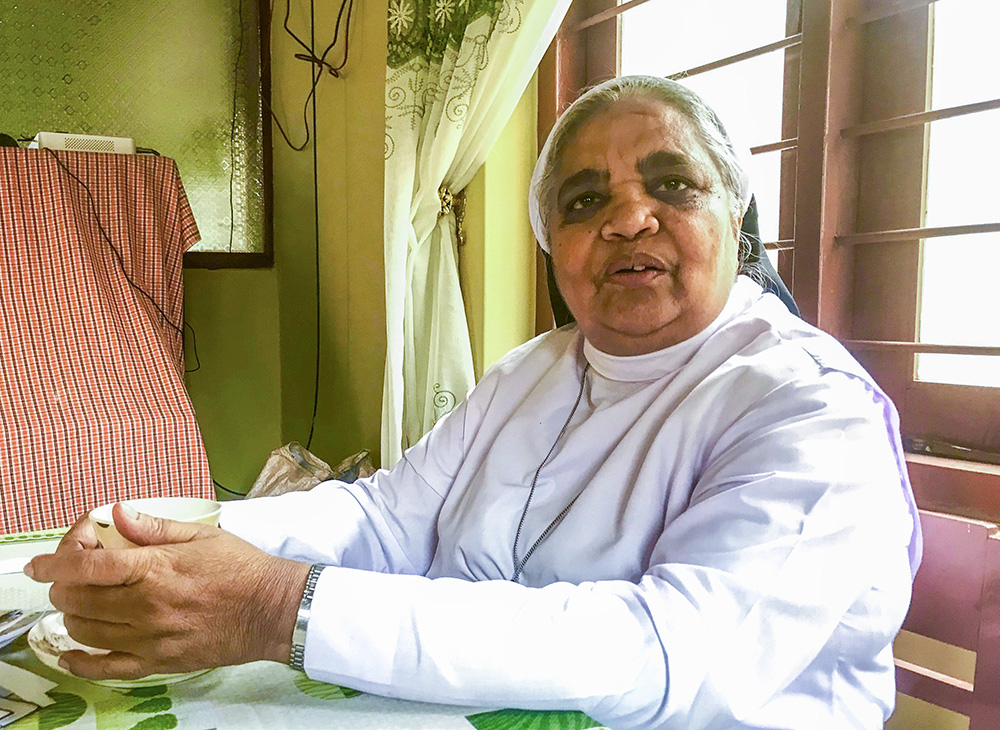
Apostolic Carmel Sr. Maria Amali narrates how she carried out the burial of more than 220 bodies collected from the debris of the devastating tsunami in 2004 in Sri Lanka. (Thomas Scaria)
We did not know their religion. But people wanted me to pray and do their last rites. One body resembled my father, and I felt shattered. However, my father was safe at home.
How do you manage such extreme stress situations?
I really don't know. But I was sure God was with me always, giving me courage, strength and confidence to do impossible things. My religious dress and the crucifix that hung from my neck, as well as the rosary in the pocket, protected me from all dangers and gave me the confidence to go forward.
Did the tsunami impact the civil war?
The tsunami had affected both the Tamil militants and the government forces. It also worsened the country's already weak economic, emotional and justice fronts. However, it did not cool down the war spirit. Some of the bloodiest encounters happened after the tsunami. After 2004, war killed almost thrice the number of tsunami victims.
The war ended in 2009, with the massacre, including LTTE leader [Velupillai] Prabhakaran, his son and all those the government considered a threat. True, I did not die in the war, but death now haunts me in the form of cancer. But I am not afraid.
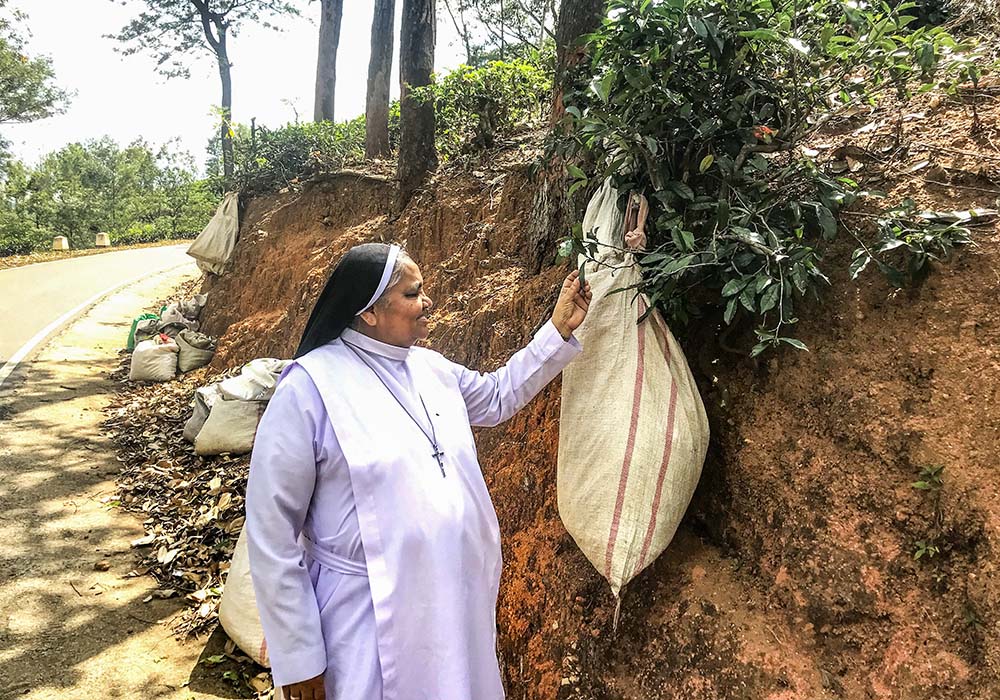
Apostolic Carmel Sr. Maria Amali looks at a collection of tea leaves at a tea plantation in Pussellawa, Sri Lanka, where she works for social and economic justice for workers. (Thomas Scaria)
Are you angry with God because of cancer after all that you have done for others?
No. It was a journey with God all through my life. This cancer has not distanced me from my Lord but brought me closer to him.
I have been undergoing treatment since my diagnosis in 2017. My pain is nothing compared to the sufferings of ordinary people in the war zones or the victims of natural calamities. I always look up to the crucified Christ.
I have undergone some surgeries and laser therapy. They transferred [me] to our eastern province, which is comparatively cooler. I continue my work for the downtrodden, especially the tea plantation workers. I will work as long as I am alive.
Tell us about your family. Why did you join the Apostolic Carmels?
My ancestors came from India several centuries ago, much before the British brought workers for their tea plantation. As many as 18 in my family have joined consecrated life. Five of them are in the Apostolic Carmel congregation. Another nine are in congregations like the Holy Family, Holy Cross, Sisters of Charity and so on. We also have four priests. So, it is a blessed family, close to God.







